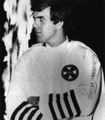1979 Birmingham municipal election
The 1979 Birmingham municipal election for the city of Birmingham was held on October 9, 1979 with five challengers vying for the mayor's office held by incumbent David Vann. Richard Arrington Jr, a 45-year old City Councilman and former Dean of Miles College campaigned with the promise to be "mayor for all the people in this city." He drew fewer white votes than he expected in the primary, but saw an upswing of support in the runoff, held on October 30. He narrowly defeated Frank Parsons to become the city's first African-American mayor.
After David Herring won the Council primary, eight candidates remained to campaign for the four open seats on the Birmingham City Council.
Arrington and fellow Council member Larry Langford had both been considered possible challengers to Vann's re-election. It was Arrington, however, that was drafted by a group of African American leaders including Abraham Woods Jr and E. W. Jarrett during a meeting on August 23, 1979 at Trinity Baptist Church. They were reacting specifically to Vann's inaction following the police shooting of 17-year-old Bonita Carter. The controversy deeply eroded Vann's support in the black community.
Although he raised only $19,000 in campaign funding and was a reluctant campaigner, Arrington secured broad support with a strong record on the City Council, having focused his efforts on reforming police procedures and involving more African Americans in city government. By contrast, Vann had a war chest of $84,000 and fellow City Council member John Katopodis had $25,000 to spend. Attorney and civic leader Frank Parsons, in his first run for public office, made the runoff. Other candidates included former WBRC-6 community affairs reporter and City Council member Larry Langford, Don Black, a white supremacist and former Ku Klux Klan Grand Wizard, and Mohammed Oliver, the nominee of the Socialist Workers' Party.
The Birmingham News' editorial board had decided to endorse Arrington in the race, but ended up endorsing both Vann and Arrington. Arrington was later told that publisher Clarence Hanson Jr had overruled the board's initial decision.
| Preceded by: 1977 |
Birmingham municipal elections 1979 |
Succeeded by: 1981 |
Gallery
Results
Mayoral election
- Richard Arrington: 31,521 votes (44.0%, runoff)
- Frank Parsons: 12,130 votes (16.9%, runoff)
- John Katopodis: 12,038 votes (16.8%)
- David Vann, incumbent: 11,448 votes (16.0%)
- Larry Langford: 2,848 votes (4%)
- Don Black: 1,783 votes (2.5%)
- Mohammed Oliver: 69 votes (0.1%)
Voter turnout was just over 55%, with approximately 71,640 ballots cast (out of 128,561 registered voters). Arrington carried the city's predominantly black precincts overwhelmingly while white voters split their votes between Parsons and Katapodis, with the incumbent, Vann, only winning one precinct. Arrington did claim an outright victory in one predominantly-white district and outpolled all opponents in another.
Initial vote totals credited Arrington with 34,865 votes, but discrepancies in ballots from Roebuck Plaza, the Jefferson County Courthouse, and W. C. Davis School forced City Clerk Jack Bailey to delay the official results until the disputed ballots could be evaluated. The official result left John Katopodis just a 97 votes shy of qualifying ahead of Parsons for a run-off with Arrington. He filed a suit hoping to uncover voting irregularities. Judge Thomas Huey ordered recount of ballots cast of Parsons, Katopodis and Vann, which added about five votes to Katopodis' total. With the result unlikely to change, Katopodis dropped the suit.
Runoff
- Arrington: 44,859 votes (51.1%)
- Parsons: 42,814 (48.9%)
Prior to the runoff between Arrington and Parsons, Vann made no endorsements. He pledged to support whichever was chosen by voters, but did make known his intention of voting for Arrington. Former mayor George Seibels endorsed Parsons. On a warm election day, voter turnout was higher than in the primary election. Around 40,000 whites (56% of 71,259 registered white voters) and 40,700 blacks (71% of 57,301 registered) appeared at the polls. About 15% of the city's white voters joined an overwhelming majority of blacks in giving Arrington the slim victory.
Arrington was sworn in as the city's first black mayor on November 13, 1979.
City Council election
- As top vote-getter, David Herring won a four-year term without having to campaign in the run-off.
Runoff
- Russell Yarbrough, 47,988 votes (4 year term)
- Pete Clifford, 46,974 votes (4 year term)
- Jeff Germany, 42,768 votes (4 year term)
- William Bell, 42,080 votes (2 year term)
- Jesse Stewart
- Richard Andrews
- Andy Smith
- Clyde Kirby
Other candidates
References
- "Arrington: Chances good if he runs for mayor." (January 19, 1979) The Birmingham News - via Birmingham Public Library Digital Collections
- Parham, Linda (October 10, 1979) "Arrington far ahead; foe in doubt" Birmingham Post-Herald - via Birmingham Public Library Digital Collections
- Friedman, Richard (October 19, 1979) "'Organization' brought Arrington commanding lead" The Birmingham News - via Birmingham Public Library Digital Collections
- "Parsons, Arrington in runoff" (October 11, 1979) The Gadsden Times
- Callaghan, Tom (October 16, 1979) "Katopodis steps aside, leaving runoff fight to Arrington and Parsons" The Birmingham News
- "Birmingham folks vote" (October 29, 1979) Tuscaloosa News
- "Black wins B'ham race" (October 31, 1979) Tuscaloosa News
- Casey, Ron (1979) "The Election of Birmingham's Black Mayor" Southern Changes: The Journal of the Southern Regional Council. Vol. 2, No. 3
- Franklin, Jimmie Lewis (1989) "Back to Birmingham: Richard Arrington Jr, and His Times" Tuscaloosa: University of Alabama Press
- Allers, Robyn, ed. (1999) Birmingham: A City Born Again: The Arrington Years 1979-1999. Birmingham: Elements/Jesse J. Lewis and Associates
- Thornton, J. Mills (2002) "Dividing Lines: Municipal Politics and the Struggle for Civil Rights in Montgomery, Birmingham, and Selma" Tuscaloosa: University of Alabama Press. ISBN 9780817311704
- Arrington, Richard (2008) There's Hope for the World: The Memoir of Birmingham, Alabama's First African-American Mayor Tuscaloosa: University of Alabama Press
External links
- Larry Langford's 1979 stump speech at Thomas School on YouTube.com





